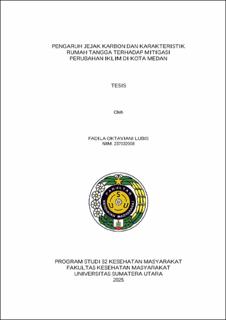Pengaruh Jejak Karbon dan Karakteristik Rumah Tangga terhadap Mitigasi Perubahan Iklim di Kota Medan
The Effect of Carbon Footprint and Household Characteristics on Climate Change Mitigation in Medan City

Date
2025Author
Lubis, Fadila Oktaviani
Advisor(s)
Nurmaini
Naria, Evi
Metadata
Show full item recordAbstract
Household activities contribute substantially to carbon emissions, primarily through energy consumption, transportation, and waste generation. Mitigating climate change at the household level is critical, as households represent fundamental social units capable of influencing consumption patterns and fostering environmentally responsible behavior. This study aims to examine the effects of household characteristics and carbon footprints on climate change mitigation in Medan City, Indonesia. An analytical cross-sectional design was employed, involving 270 households selected through purposive sampling. Data were analyzed using linear regression techniques. The findings revealed that the average household carbon footprint in Medan City was 731.56 kg CO₂e per month, with the energy sector accounting for the highest contribution at 63%. The largest proportion of households in Medan City falls into the moderate climate change mitigation category, totaling 127 households (47.0%), followed by the low category with 91 households (33.7%) and the high category with 52 households (19.3%). Significant associations were identified between climate change mitigation and several household characteristics, including house size (p = 0,003; 95% CI=(-0,485)-(-0,799)), household income (p = 0,001; 95% CI=0,712-0,504), carbon footprints from the energy sector (p = 0,024; 95% CI=(-0,032)-(-0,043)) and the waste sector (p = 0,001; 95% CI=0,020-0,011)) were found to significantly influence mitigation efforts. Multivariate analysis indicated that household income was the most dominant variable influencing climate change mitigation. The model’s R2 value of 0,223 suggests that house size, household income, and carbon footprints from the energy and waste sectors collectively explain 22,3% of the variance in household mitigation behaviors. In conclusion, both carbon footprint levels and household characteristics play pivotal roles in determining household climate change mitigation practices. Strengthening environmental awareness and promoting the adoption of sustainable solutions are essential strategies for enhancing climate change mitigation efforts at the household level.
Collections
- Master Theses [2435]
